Health Education Tools and Trainings
Professional development (PD) and training in health education is associated with successful implementation of classroom instruction.1-3

Successful in-service PD programs can improve both the amount of time teachers spend on health topics and their confidence to provide health and sexual health instruction.4-5
Research shows that professional development helps to boost teacher credibility among and empathy with students. Improved credibility can help increase the value students place on the topics being taught and their knowledge of the topics.6
Furthermore, a review of 19 HIV and STD prevention curricula for professional development found that nearly all effective curricula trained educators in using a variety of teaching or instructional strategies.7
Professional development should provide health education teachers with necessary skills to use innovative teaching strategies to develop students’ health-related attitudes, knowledge, and skills.
See CDC’s guidance on Professional Development Practices for resources on planning, implementing, and evaluating PD for school health.
Check out more CDC tools and resources to support health education professional development and training for staff in schools, departments of education, departments of health, and national organizations.
Education Tools and Resources
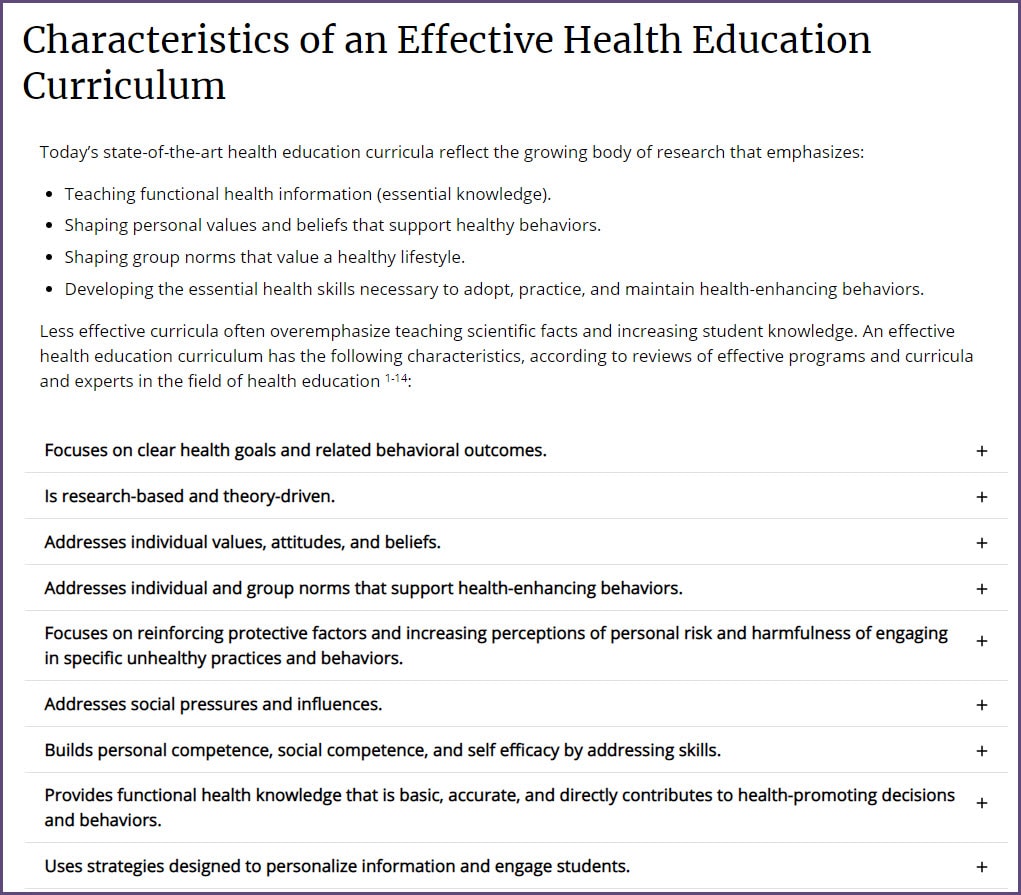 Characteristics of Effective Health EducationThis resource highlights 15 characteristics of effective health education curriculum based on a growing body of research and evaluation.
Characteristics of Effective Health EducationThis resource highlights 15 characteristics of effective health education curriculum based on a growing body of research and evaluation.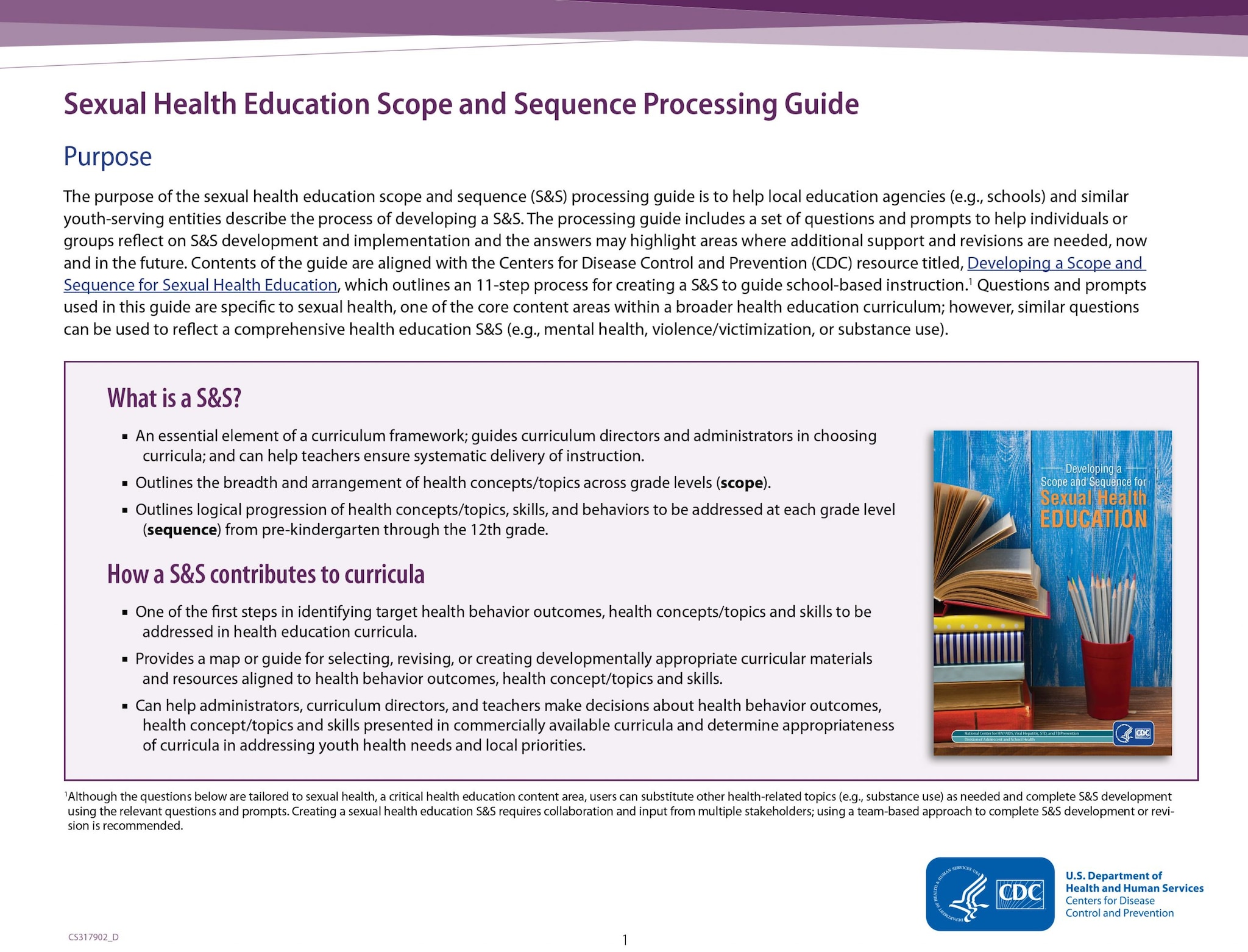 Sexual Health Education Scope and Sequence Processing Guide [PDF - 418 KB]This tool helps local education agencies and youth-serving entities reflect on scope and sequence development and implementation, and plan for future revisions.
Sexual Health Education Scope and Sequence Processing Guide [PDF - 418 KB]This tool helps local education agencies and youth-serving entities reflect on scope and sequence development and implementation, and plan for future revisions.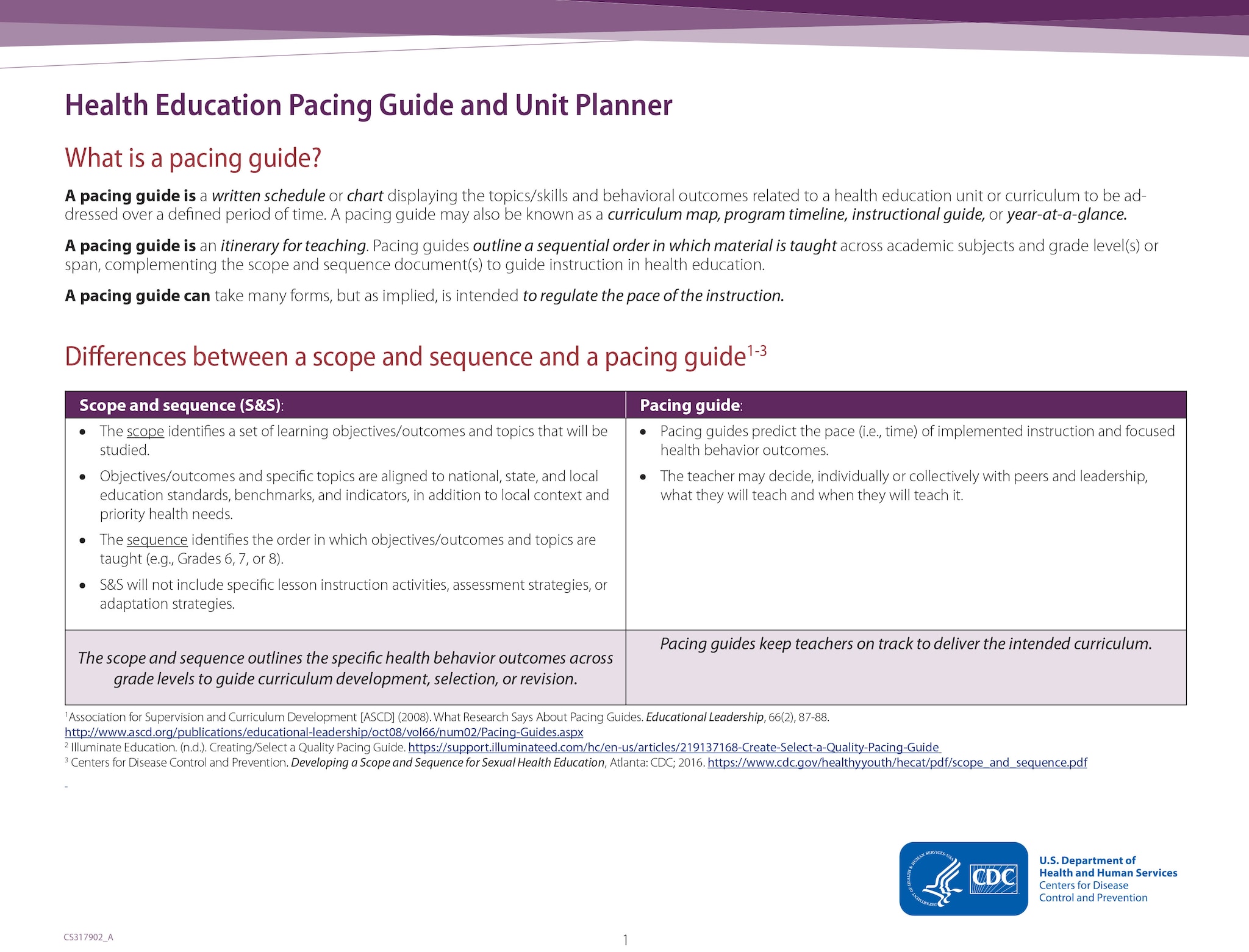 Health Education Pacing Guide and Unit Planner [PDF - 283 KB]This tool provides templates and considerations for schools to use when creating a pacing guide or unit plan for health education.
Health Education Pacing Guide and Unit Planner [PDF - 283 KB]This tool provides templates and considerations for schools to use when creating a pacing guide or unit plan for health education. Developing a Scope and Sequence for Sexual Health Education [PDF - 2 MB]This resource provides a step-by-step process to create or revise a scope and sequence for sexual health education.
Developing a Scope and Sequence for Sexual Health Education [PDF - 2 MB]This resource provides a step-by-step process to create or revise a scope and sequence for sexual health education. School Health IndexThis resource serves as an online self-evaluation and planning tool for schools to identify the policies and practices most likely to be effective in reducing youth health risk behaviors, including those related to health education.
School Health IndexThis resource serves as an online self-evaluation and planning tool for schools to identify the policies and practices most likely to be effective in reducing youth health risk behaviors, including those related to health education.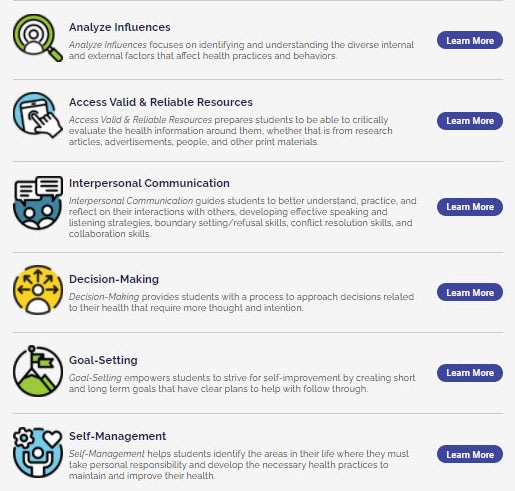 Skills-based Health Education ModelsThese skill guides from RMC Health provide information for educators on how to teach the 7 key health skills aligned with the National Health Education Standards.
Skills-based Health Education ModelsThese skill guides from RMC Health provide information for educators on how to teach the 7 key health skills aligned with the National Health Education Standards.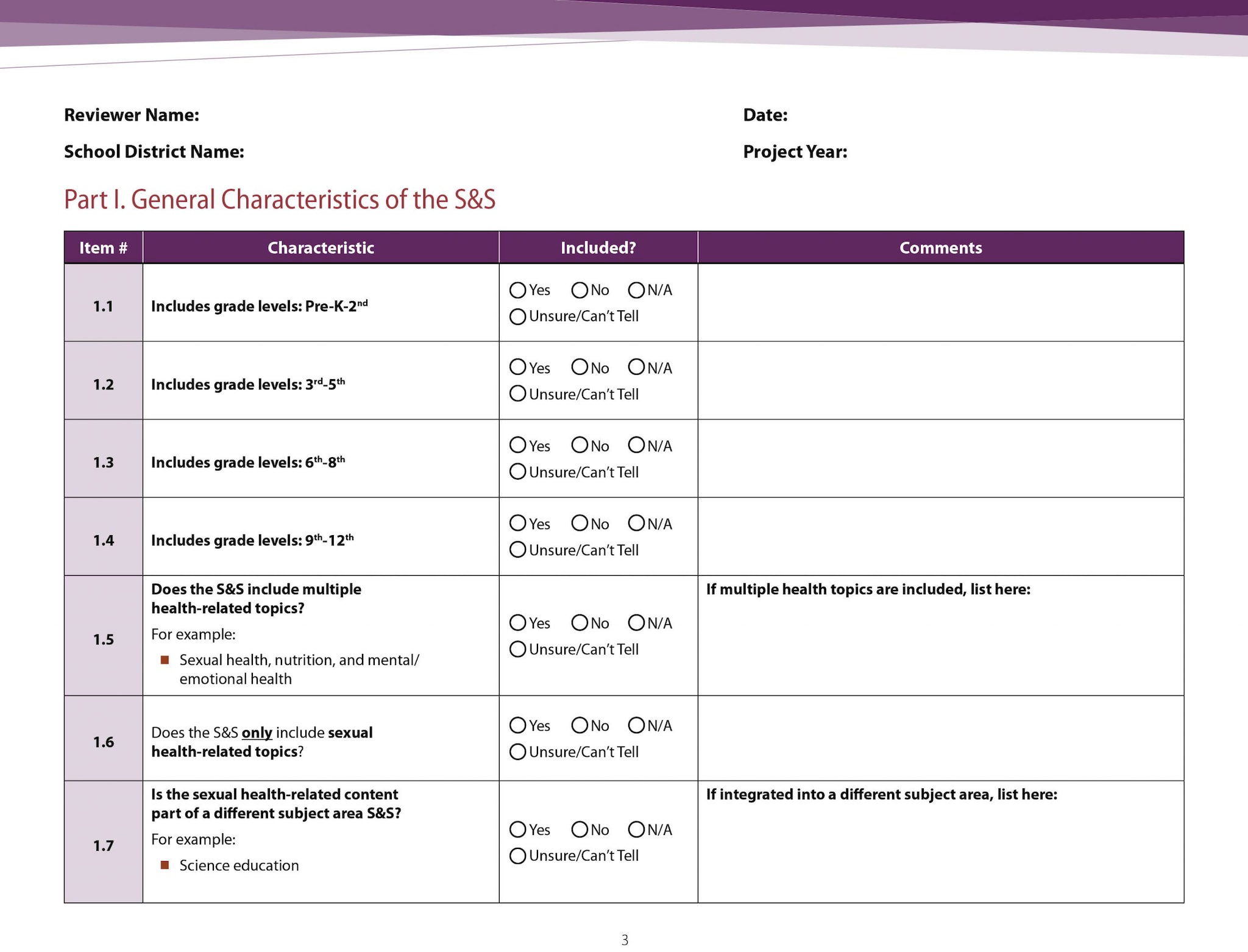 Sexual Health Education Scope and Sequence Checklist [PDF - 317 KB]This tool assists individuals or groups in reviewing their existing sexual health education scope and sequence for core characteristics end elements.
Sexual Health Education Scope and Sequence Checklist [PDF - 317 KB]This tool assists individuals or groups in reviewing their existing sexual health education scope and sequence for core characteristics end elements.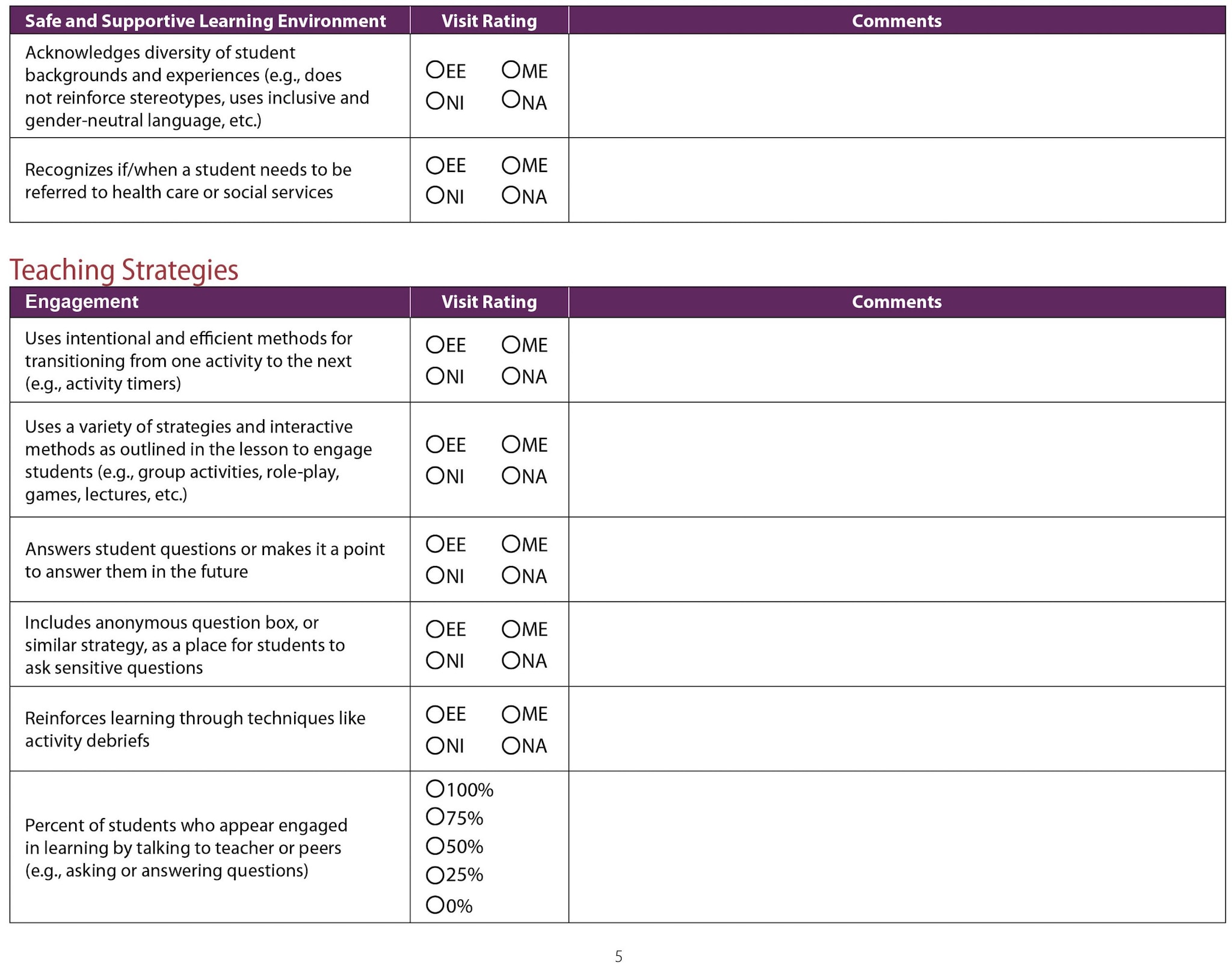 Health Education Teacher Coaching Form [PDF - 357 KB]This sample coaching form helps facilitate coaching and mentoring of health education teachers to build instructional practices associated with effective health education.
Health Education Teacher Coaching Form [PDF - 357 KB]This sample coaching form helps facilitate coaching and mentoring of health education teachers to build instructional practices associated with effective health education.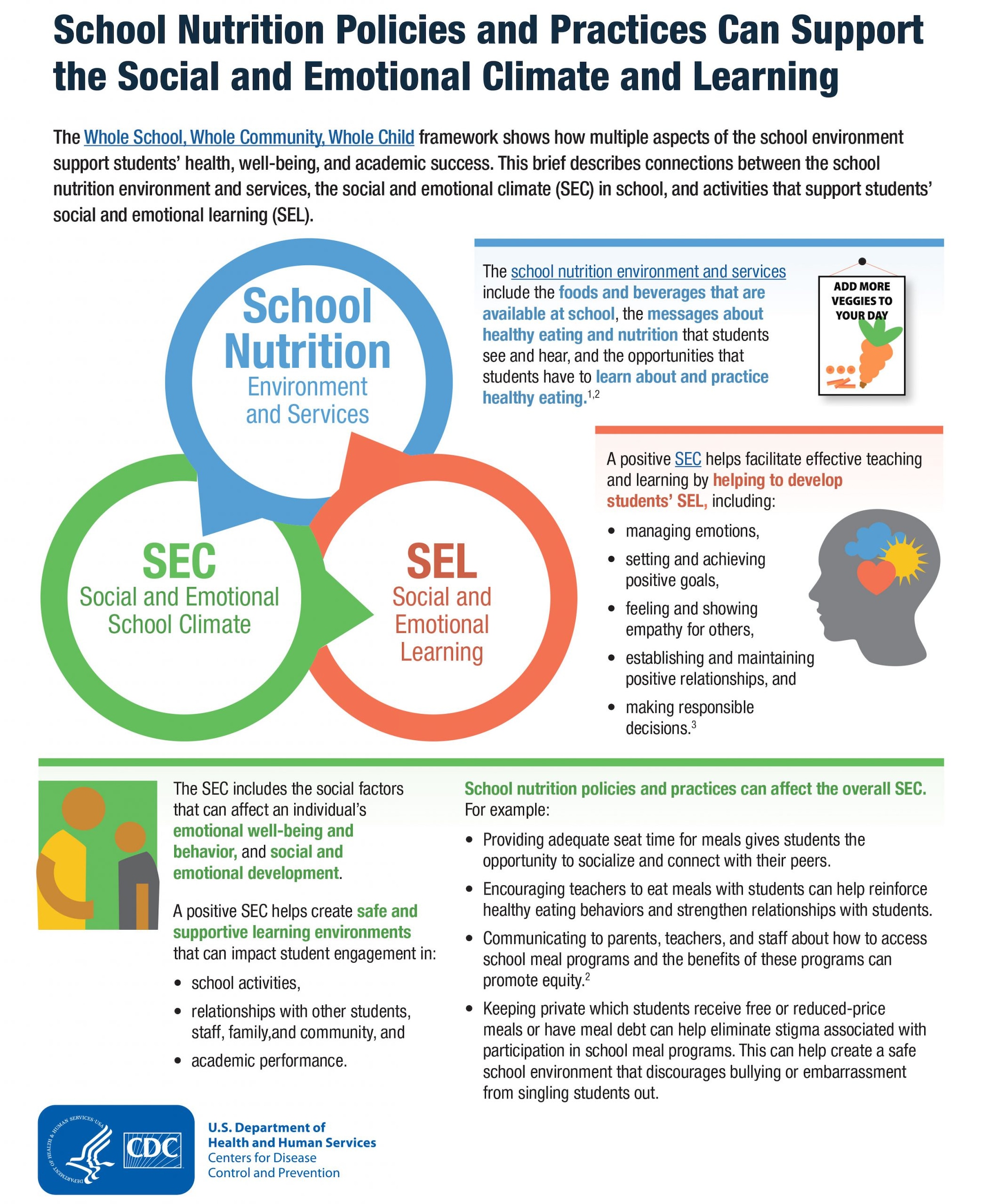 Social and Emotional Climate and Health EducationThis research brief highlights school nutrition policies and practices to support the school social emotional climate and learning.
Social and Emotional Climate and Health EducationThis research brief highlights school nutrition policies and practices to support the school social emotional climate and learning.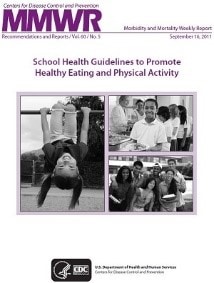 School Health Guidelines to Promote Healthy Eating and Physical ActivityThese guidelines serve as the foundation for developing, implementing, and evaluating school-based healthy eating and physical activity policies and practices for students.
School Health Guidelines to Promote Healthy Eating and Physical ActivityThese guidelines serve as the foundation for developing, implementing, and evaluating school-based healthy eating and physical activity policies and practices for students.
- Clayton HB, Brener ND, Barrios LC, Jayne PE, Everett Jones S. Professional development on sexual health education is associated with coverage of sexual health topics. Pedagogy Health Promot. 2018;4(2):115-124. doi: 10.1177/2373379917718562.
- Kealey KA, Peterson Jr AV, Gaul MA, Dinh KT. Teacher training as a behavior change process: principles and results from a longitudinal study. Health Educ Behav. 2000;27(1):64-81.
- Pateman B, Grunbaum JA, Kann L. Voices from the field—a qualitative analysis of classroom, school, district, and state health education policies and programs. J Sch Health. 1999;69(7):258-263.
- Telljohann SK, Everett SA, Durgin J, Price JH. Effects of an inservice workshop on the health teaching self-efficacy of elementary school teachers. J Sch Health. 1996;66(7):261-265.
- Levenson-Gingiss P, Hamilton R. Evaluation of training effects on teacher attitudes and concerns prior to implementing a human sexuality education program. J Sch Health. 1989;59(4):156-160.
- Gray DL, Anderman EM, O’Connell AA. Associations of teacher credibility and teacher affinity with learning outcomes in health classrooms. Soc Psychol Educ. 2011;14(2):185-208.
- Kirby D. Emerging Answers 2007: Research findings on programs to reduce teen pregnancy and sexually transmitted diseases. Washington, DC: National Campaign to Prevent Teen and Unplanned Pregnancy; 2007.